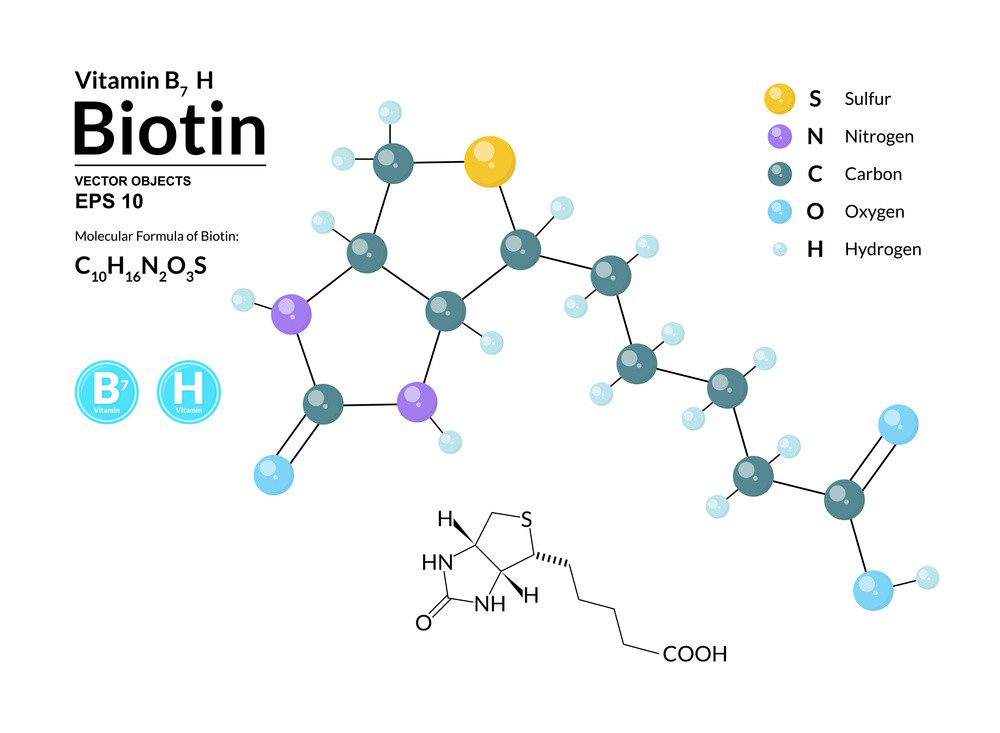Biotin capsules are dietary supplements that contain a concentrated form of biotin. They are typically made by isolating biotin from natural sources or synthesizing it in a laboratory. Biotin capsules come in various dosages, ranging from a few micrograms to several milligrams per capsule.
Biotin capsules, often marketed as supplements, are typically taken orally. Here’s a breakdown of their efficacy and functions:
Hair, Skin, and Nails Health: Biotin is often associated with promoting healthy hair, skin, and nails. While research on the effectiveness of biotin supplements for these purposes is somewhat limited, some studies suggest that biotin supplementation may improve the strength and thickness of hair and nails, as well as the overall health of the skin.
Metabolism Support: Biotin plays a key role in the metabolism of fats, carbohydrates, and proteins. It acts as a coenzyme in several metabolic reactions, helping to convert nutrients into energy. This function is essential for overall health and vitality.
Blood Sugar Regulation: Some research suggests that biotin may help regulate blood sugar levels, particularly in people with type 2 diabetes. Biotin may enhance the activity of enzymes involved in glucose metabolism, potentially improving insulin sensitivity.
Pregnancy and Breastfeeding: Biotin is important for fetal development during pregnancy, and deficiency during pregnancy may lead to birth defects. Additionally, breastfeeding mothers may have increased biotin requirements. Biotin supplements are sometimes recommended for pregnant and breastfeeding women to ensure adequate intake.

Neurological Health: Biotin is involved in the synthesis of neurotransmitters and may play a role in maintaining healthy neurological function. Some studies suggest that biotin supplementation could be beneficial for certain neurological conditions, although more research is needed in this area.
Deficiency Treatment: Biotin deficiency is rare but can occur in individuals with certain genetic disorders, prolonged antibiotic use, or prolonged consumption of raw egg whites (which contain a protein that binds biotin and prevents its absorption). Biotin supplementation is the primary treatment for biotin deficiency, and it is usually effective in restoring normal biotin levels.
It’s important to note that while biotin supplementation is generally considered safe, excessive intake of biotin supplements can lead to potential side effects and interactions with medications. It’s always advisable to consult with a healthcare professional before starting any new supplement regimen, especially if you have underlying health conditions or are taking medications.
The potential benefits of Biotin Capsules
Biotin, also known as vitamin B7 or vitamin H, is a water-soluble vitamin that plays a vital role in various bodily functions. Biotin is often touted for its potential benefits for hair, skin, and nails, but it also has other important functions in the body. Here are some potential benefits of biotin capsules:
Promotes Healthy Hair: Biotin is often associated with hair health. It plays a key role in the production of keratin, a protein that makes up the structure of hair. Adequate biotin levels may help promote hair growth and prevent hair thinning or loss.
Supports Skin Health: Biotin is involved in the maintenance of healthy skin. It helps in the production of fatty acids, which are essential for maintaining healthy skin cells. Some people take biotin supplements to address skin conditions like acne or dry, flaky skin.
Strengthens Nails: Biotin is also believed to strengthen nails. Adequate biotin levels may help prevent brittle nails and promote nail growth.
Supports Metabolism: Biotin is involved in the metabolism of carbohydrates, fats, and proteins. It helps convert these nutrients into energy that the body can use. Some people take biotin supplements to support their metabolism and energy levels.
Maintains Blood Sugar Levels: Biotin may play a role in regulating blood sugar levels by assisting in the breakdown of carbohydrates and promoting insulin sensitivity. Some research suggests that biotin supplementation could be beneficial for individuals with diabetes or insulin resistance.

May Aid in Pregnancy: Pregnant women may have increased biotin requirements, as biotin is important for fetal development. Some studies suggest that biotin supplementation during pregnancy may support fetal growth and development, although more research is needed in this area.
Supports Nervous System Function: Biotin is involved in the production of neurotransmitters, which are important for brain function and nervous system health. Adequate biotin levels may help support cognitive function and mood regulation.
It’s important to note that while biotin supplements are generally considered safe for most people when taken at recommended doses, excessive intake can cause adverse effects. Additionally, individual responses to biotin supplementation may vary, and it’s always a good idea to consult with a healthcare professional before starting any new supplement regimen, especially if you have underlying health conditions or are taking medications.
